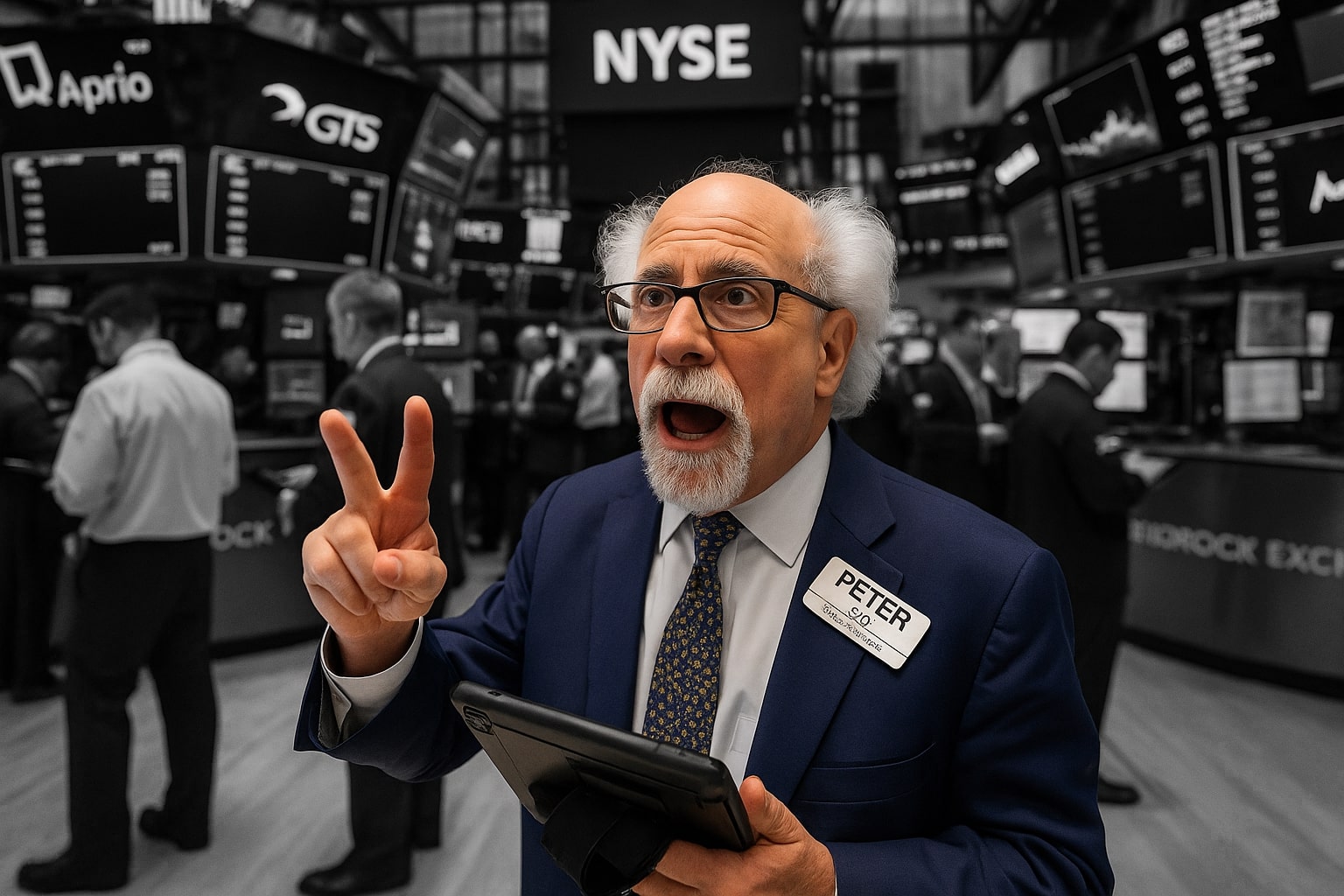
Pre Market Trading News - Global Market Surge After U.S. Tariff Delay: Oil, Tech, and Stock Market Reactions
How will delayed U.S. tariffs and fluctuating global oil prices impact stocks like Apple (AAPL) and Brent Crude (BZ=F) in the coming weeks? | That's TradingNEWS
Market Movements Amid Global Trade Uncertainty: Stocks, Commodities, and Key Indices Update
Global markets have been on a rollercoaster ride over the last week, with volatility largely driven by U.S. President Donald Trump’s tariff threats and policy shifts. The markets responded positively after Trump announced a delay to the 50% tariffs on European Union goods, a reprieve that lifted global indices temporarily. The MSCI's broadest index of world shares saw a slight uptick of 0.2%, and Europe's pan-European stocks index (.STOXX) gained 1%, recovering after Trump’s initially alarming tariff comments. Meanwhile, the S&P 500, Dow Jones Industrial Average, and the Nasdaq Composite all faced declines last Friday, with the Nasdaq dropping 1%, reflecting how sensitive tech stocks have become to Trump’s unpredictable trade moves, particularly with major players like Apple (AAPL).
Tariff Uncertainty Impacting U.S. Stocks and Tech Giants
The Nasdaq was notably affected, closing at 18,737.21, with a sharp drop from the previous session. The sell-off was particularly evident in the tech sector, with Apple (AAPL) being a prime target for the tariff concerns. After Trump’s tariff announcement, which affected tech giants like Apple and Tesla (TSLA), the market saw a reduction in tech stock values. As the situation with the U.S. and EU negotiations continues to develop, the outcome will be pivotal for companies heavily reliant on European markets. The unpredictability of trade policies, as highlighted by Commerzbank analysts, signals that U.S. assets may face increased risk premiums, potentially leading to a decline in the dollar and further volatility in U.S. equity markets.
Dollar Declines as Uncertainty Surrounds Trade Policies
The U.S. Dollar Index (DXY) fell 0.1%, continuing its downward trend amid global trade uncertainty. This was a result of not only the tariff news but also the broader sentiment around the erosion of U.S. economic dominance. The euro surged to $1.1382, its highest level since late April, reflecting investor confidence in the EU as the tariff delay buys more time for negotiations. Christopher Wong, currency strategist at OCBC, pointed out that the continuing uncertainty surrounding Trump’s trade policies could undermine confidence in the dollar, especially as the global economic outlook becomes more unpredictable.
Oil Prices Adjust Amid Tariff News and Supply Concerns
Oil prices saw minor increases as Trump’s tariff delay eased some immediate concerns in the markets. As of the latest data, Brent Crude traded at $64.90 per barrel, while West Texas Intermediate (WTI) crude was up to $61.29 per barrel. Despite the price hike, concerns over an oversupply of oil have kept the upside limited. The OPEC+ group’s potential decision to increase production in July remains a key point of concern for oil traders. The ongoing production growth from the U.S. and countries like Qatar and Saudi Arabia further complicates the outlook for crude oil. In the U.S., the Energy Information Administration (EIA) reported a 1.3 million-barrel increase in crude inventories, exacerbating concerns about oversupply despite stronger demand signals from the summer driving season.
For now, WTI remains caught within a price range between $58 and $63 per barrel, with technical traders eyeing support levels around $60 as the next major threshold. Given that the price has struggled to sustain gains above $64, the market sentiment remains cautious, with many traders wary of a possible downside correction if supply concerns continue to weigh on prices.
Gold Prices Surge Amid Trade Tensions and Economic Worries
As oil prices struggle for direction, gold has found solid ground amid the heightened global trade tensions and rising economic uncertainties. The precious metal surged to $3,328 an ounce, reflecting its safe-haven appeal. Gold (XAU-USD) has been on an upward trajectory, with some analysts, such as those at Citi, adjusting their near-term targets to $3,500 per ounce due to escalating tariff threats and geopolitical concerns. With the U.S. dollar under pressure and central banks showing signs of concern over global inflation and trade disputes, gold’s rally is expected to continue in the short term. This price level is now the highest in nearly two weeks, and traders are watching for any break above $3,350 for further bullish signals.
Chinese Market Struggles Amid Tariff Fears and EV Price Cuts
In Asia, China's Hang Seng Index faced significant headwinds, losing 1.35% as investors reacted negatively to price cuts announced by BYD (1211.HK), a leading electric vehicle maker. The price cuts, aimed at spurring sales amid fierce competition, triggered a 9% drop in BYD’s stock, as investors worried about the potential for a price war in the already competitive electric vehicle market. This reflects broader concerns about Chinese growth amid trade uncertainty and the ripple effects from the U.S.-China tariff war. While BYD’s stock took a hit, shares of other automakers in China also retreated, highlighting the fragility of investor sentiment in the region.
Indian Stock Market Surges Despite Mixed Earnings Results
Meanwhile, in India, the benchmark Nifty 50 Index rose by 0.53%, climbing above the 25,000 mark, while the Sensex gained 455 points to close at 82,176. Strong earnings reports from companies like Gillette India, which saw its net profit rise by 61% YoY, boosted investor sentiment. However, some stocks like Balkrishna Industries faced downward pressure after disappointing Q4 results, with the stock dropping by 10%. Other top performers included JSW Steel, which gained 3% on news that the Supreme Court allowed it to file a review petition on a previous decision, signaling potential relief for the company. In the broader market, Narayana Health and Divi's Labs saw positive gains, with the latter surging 4% on the back of a new supply deal with a global pharma company.
Global Index Movements and the Market Outlook
Globally, South Korean stocks performed strongly, with the KOSPI index rising 2.02% as traders reacted to Trump’s tariff delay. Hyundai-Rotem and Hyundai Engineering & Construction were standout performers, up 8.93% and 7.38% respectively. This was also reflected in other sectors, with key heavyweights like LG Electronics and SK Hynix making notable gains. Despite this, China's CSI300 index closed 0.6% lower, continuing the trend of underperformance in Chinese stocks due to tariff fears and slowing economic growth.
Stock Market Performance: Sector Rotation and Earnings Reports
As global markets continue to navigate through trade tensions, U.S. and European stocks will likely remain volatile in the near term. The uncertain outlook for tech stocks like Apple (AAPL), combined with the shifting economic dynamics, means that investors are likely to seek diversification, particularly in European and Asian markets. The current trend of sector rotation, with technology stocks facing a pullback and energy and commodity stocks gaining traction, highlights the ongoing adjustments that traders are making in response to the evolving macroeconomic landscape.
For now, investors will be keenly watching developments around U.S.-EU trade talks, OPEC+ decisions on production, and the overall trajectory of oil and gold prices. The mixed earnings results and cautious sentiment in global markets suggest that volatility may persist, making it crucial for traders to remain nimble and closely monitor key economic data, earnings reports, and geopolitical developments.
That's TradingNEWS
Read More
-
GPIQ ETF Price Forecast: Can a 10% Yield at $52 Survive the Next Nasdaq Selloff?
09.02.2026 · TradingNEWS ArchiveStocks
-
XRP ETF Price Forecast: XRPI at $8.32, XRPR at $11.86 as $44.95M Inflows Defy BTC and ETH Outflows
09.02.2026 · TradingNEWS ArchiveCrypto
-
Natural Gas Futures Price Forecast: Will The $3.00 Floor Hold After The $7 Winter Spike?
09.02.2026 · TradingNEWS ArchiveCommodities
-
Stock Market Today: Dow Back Under 50K While S&P 500 and Nasdaq Push Higher as Gold Reclaims $5,000
09.02.2026 · TradingNEWS ArchiveMarkets
-
USD/JPY Price Forecast: Can Bulls Clear 157.5 Without Triggering a 160 Intervention Line?
09.02.2026 · TradingNEWS ArchiveForex


















